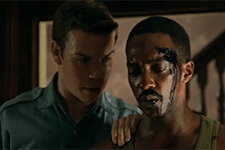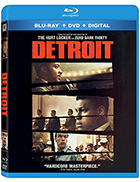Detroit
|  There are things that we know and things that we don’t know about the subject of Kathryn Bigelow’s Detroit. What we do know is that the racially charged 12th Street Riot in Detroit began in the early morning hours of Sunday, July 23, 1967, after the police, which was predominantly white and notorious for its racist and abusive practices, raided an illegal black-owned after-hours bar. We also know that, during the night of July 25–26, 1967, police, state troopers, and members of the Michigan National Guard descended on the Algiers Motel, approximately a mile from where the riots started, where shots were reportedly fired. Three black teenagers ended up shot to death inside, which was widely blamed on police officers. After that, though, we quickly descend from confirmable facts into a murky morass of conflicting and unreliable eye witness testimony, speculation, and possible—no, probable—outright lies. In other words, we’re in the unknown and unknowable. This is the same territory Bigelow and journalist-turned-screenwriter Mark Boal mined in Zero Dark Thirty (2012), their crackling, controversial drama about the hunt for Osama bin Laden (they had previously collaborated on the 2008 Oscar-winning war drama The Hurt Locker). Like Zero Dark Thirty (and, before it, Oliver Stone’s great JFK in 1991), Detroit takes us deep into a charged historical moment and fills in the unknowns with heightened dramatic intensity. The entire middle section of the film is an unrelenting horrorshow of police brutality, cruelty, and outright murder. This is, in a sense, the core of the film, and Bigelow crafts it with such conviction and control of her cinematic craft that it’s easy to think that you’re seeing something genuinely masterful. And, in isolated moments, it is. There are parts of Detroit that are utterly harrowing, and the accumulated scenes produce a sense of real social injustice that will send most people out of the theater infuriated at the miscarriage of justice they have just witnessed. However, Detroit doesn’t quite reach the heights of Bigelow’s previous two films, both of which were rooted in-the-moment (the ending of Zero Dark Thirty had to be completely rewritten after bin Laden was killed). Detroit is Bigelow’s first historical film, although given our current era’s increasing racial tensions and controversies around excessive police force, especially directed at African Americans, it feels (unfortunately) very contemporary. Bigelow and cinematographer Barry Ackroyd (a favorite of Paul Greengrass’s who is reuniting with Bigelow after their work together on The Hurt Locker) frame the film’s action in a quasi-documentary style with handheld cameras and a gritty look that merges style and era; when they insert actual documentary footage from the riots and newscasts, it is often indistinguishable from the fiction, which serves to reinforce the sense of veracity drawn from scenes that are largely speculative. The film’s scope is simultaneously broad and narrow, but conventionally linear (unlike journalist John Hersey’s 1969 account The Algiers Motel Incident, which took an unconventional fragmentary-collage approach to recounting the events). It begins in wide-angle historical-drama fashion in dramatizing the raiding of a “blind pig” (an illegal after-hours bar) and the arrest of everyone inside, which sets off what turned out to be a nearly week-long riot in the Motor City, which, as an animated introduction informs us, was a cauldron of simmering racial tensions. Boal’s screenplay then begins to draw us into a dozen or so major characters, many of whom are admirably fleshed out despite the narrative net being necessarily cast wide, which produces an interwoven thread of perspectives. The central victim perspective belongs to Larry (Algee Smith), the lead singer of an upcoming R&B group called the Dramatics whose big moment on-stage is cut short by the riots, which forces the evacuation of the theater. He and his friend and manager Fred (Jacob Latimore) retreat to the Algiers Motel for the night, where they are placed in an adjacent house known as the Manor House. There they meet two white girls, Karen (Kaitlyn Dever) and Julie (Hannah Murray), and through them a number of other young black men staying at the motel, including a recently returned Vietnam veteran named Greene (Anthony Mackie). All of them end up being victimized by the police, who descend on the motel after one of the tenants jokingly fires a starting pistol out the window; the irony is that the shooter does this in a mocking manner to make the guardsmen feel the pain of being black, but ends up inflicting real suffering and death on himself and two other young black men). The two primary officers are Krauss (Will Poulter), who had already shot and killed a looter earlier that day, and Flynn (Ben O’Toole), whose sweat-slicked hair makes him look a bit like an angry, rather than smug, version of “Pharma Boy” Martin Shkreli. Together, they brutalize nine of the motel’s tenants in search of information, although one can’t help but feel that it is little more than a game of racially charged power mongering (Poulter is particularly sadistic in this regard, and the fact that he looks like he escaped from a Norman Rockwell painting makes his actions seems all the more insidious). Much of the action is witnessed by Melvin Dismukes (John Boyega), a security guard who understands all too well the nebulous space he inhabits as a black man in a uniform that, for most of the black men around him, represents oppression. As Bigelow presents it, the events that transpired that night are a kind of microcosm of the American racial powder keg exploding in the dead of night and hidden from prying eyes (the film’s middle section is set entirely within the Manor House, and it develops the taut, claustrophobic feel of a horror movie). Power is distilled to its most chilling essence: simple dehumanization. What makes the events in the Manor House so disturbing is not just the physical violence and the killing, but the psychological torment, in which the young black men (and the two white women who know that they are vulnerable precisely because of their association with people of color) see their worst nightmares come true. The white police officers are sadists, but they are also imminently practical, and the screenplay makes it clear that they are aware of the stakes and their own culpability. Boal inserts a few decent white officers, including one who finds Greene after he escapes from the house, to ensure that Detroit doesn’t descend into a simplistic barrage of lionized black victims and demonized white officers (although it comes close numerous times). Like Hersey’s book (which is not credited as a source, interestingly), Bigelow’s film is clearly designed to infuriate and provoke—to draw attention to the literal blood that is drawn from racial unrest and abuse of power. As a story with a clear sense of moral order, Detroit is a frequently powerful and unnerving experience, one that is hard, at times, to watch for both the physical damage to various bodies and the violence inflicted on justice and the social order in the film’s third act, where we see the police officers go on trial. Bigelow and Boal’s collected outrage sometimes overwhelms the film, which flows in fits and starts. Characters tend to get lost, although those who stand out (particularly Larry and Krauss) sear your memory. Having moved on from her roots in less socially minded action fare, Bigelow has proven that she can marry intense aesthetic engagement with complex moral inquiry, and even if Detroit doesn’t quite live up to expectations, it certainly succeeds in reminding us that some old wounds never quite heal and we desperately need to recognize why lest they infect the entire body politic forever.
Copyright © 2017 James Kendrick Thoughts? E-mail James Kendrick All images copyright © 20th Century Fox Home Entertainment | |||||||||||||||||||||||||||||||
Overall Rating: 

 (3)
(3)


